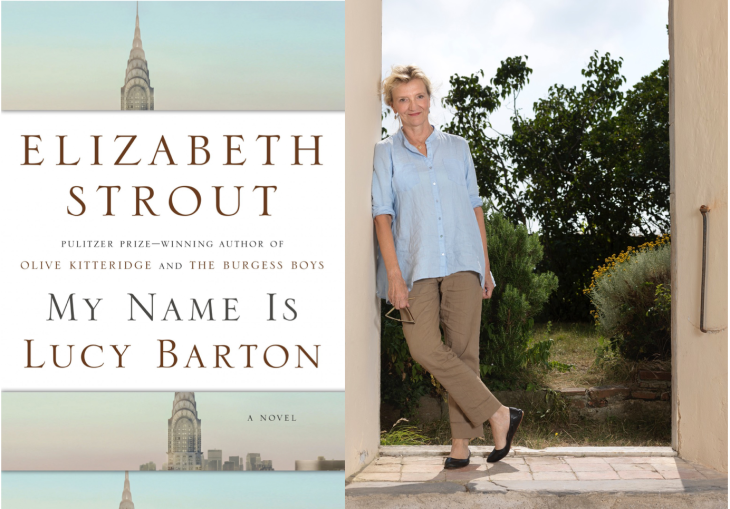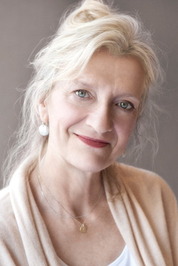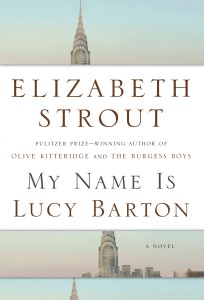
The first time I met Pulitzer Prize-winning author Elizabeth Strout in person was last fall, at the Texas Book Festival. She and another of my favorite writers, Elizabeth McCracken, were discussing the art of storytelling in the sanctuary of a Methodist church, the only venue large enough to hold everyone who had come to see them. It had been a while since I’d been inside a church, I admit, and as I sat in that pew among hundreds (thousands?) of other book-lovers, listening to these two brilliant, kind, funny people discuss how they create their stories, I thought, Now this is a church I would attend regularly: The Church of The Elizabeths.
As far as I know, Strout has no plans to become a preacher, so the closest thing we can get to a sermon is her new book, My Name Is Lucy Barton. I feel as if telling you the plot — that it’s a series of memories of childhood and meditations on adulthood that take place during a brief hospital visit between a grown woman, Lucy Barton, and her mother — isn’t enough. Likewise, I’m not sure calling this book “poetic” or “beautiful” or “quietly devastating” quite captures it. It’s hard to find the words to describe something made out of someone else’s far superior words, you know? Speaking of which, here’s one of my favorite observations from its pages:
“I have sometimes been sad that Tennessee Williams wrote that line for Blanche DuBois, ‘I have always depended on the kindness of strangers.’ Many of us have been saved many times by the kindness of strangers, but after a while it sounds trite, like a bumper sticker. And that’s what makes me sad, that a beautiful and true line comes to be used so often that it takes on the superficial sound of a bumper sticker.”
If I’m doing an inadequate job explaining why you should read this book, accept my apologies, please. And take it from the much better words of Ann Patchett, who said “A lot of people would have thought that Elizabeth Strout could never write a book better than Olive Kitteridge. But this new book is my favorite Strout novel by far.” Or trust NPR or The New York Times or any of the many spectacular reviews or fellow book-lovers who have declared it a masterpiece. Or just read it yourself and see. Meanwhile, enjoy the interview below. And whatever you do, be at the downtown library this Thursday, January 21, at 6:15, when Strout is here and church convenes again.
Enjoy,
Mary Laura Philpott
Editor of MUSING
How did this story bubble up for you? Where did it start?
 ES: My Name Is Lucy Barton took me by surprise. It bubbled up from some sketches I had on my table – a few scenes with a mother and daughter in a hospital – and I kept thinking, “Eh,” but it came back around to me again and again and so I knew from experience to pay attention to that, and so I finally said, OK, Lucy, let’s go!
ES: My Name Is Lucy Barton took me by surprise. It bubbled up from some sketches I had on my table – a few scenes with a mother and daughter in a hospital – and I kept thinking, “Eh,” but it came back around to me again and again and so I knew from experience to pay attention to that, and so I finally said, OK, Lucy, let’s go!
I wonder if you relate to what Lucy, who is a writer, says about traveling for a book tour: “A hotel room is a lonely place. Oh God it is a lonely place.” Do you enjoy traveling for speaking engagements, or do you often wish to be back home?
ES: Both. I enjoy very much meeting my readers, but there are times I wish I could go home. About hotel rooms, I have experienced both sides; I have found them, some of them, to be terribly lonely. And then I have found others to be cozy and lovely, and who is to say why? A lot depends on how I am feeling at the time, and also I guess the room itself.
This is not a “funny book,” but there are so many subtle lines that made me laugh. Do you tend to see the humorous side of not-so-humorous situations around you?
ES: I am so glad you laughed at lines in this book. I often find humor in the smallest things.
This isn’t the first time you’ve written about parents and their grown children. What is it about the parent-child relationship that makes for endless storytelling possibilities?
 ES: Yes, the parent/child relationship does make for endless material for a novelist, or at least this novelist. I think because a parent is the most primal relationship we have, we can’t help but view the world first through them, and that’s very powerful, and then all the years of separating and being oneself. I’m just drawn to it, the way others are drawn to spies or kings or gardens.
ES: Yes, the parent/child relationship does make for endless material for a novelist, or at least this novelist. I think because a parent is the most primal relationship we have, we can’t help but view the world first through them, and that’s very powerful, and then all the years of separating and being oneself. I’m just drawn to it, the way others are drawn to spies or kings or gardens.
You articulated so beautifully one of Lucy’s very relatable conflicts: the difference between how she is perceived by the people around her in her current life and how she is perceived by people from her past. As a lifelong writer who started publishing books only in your 40s, did you find that it took awhile before family and old friends saw you as someone who was serious about writing? And if so, did you care?
ES: You know, that is a great question. I had been writing really my entire life, and very few people knew of it, although of course my family and old friends did. But when I began to have a public career I think it took my family and old friends a bit by surprise. I had been so solitary in my endeavor for so long, that when they all found out it had “worked” so to speak, I think they may have found it was strange.
Fill in the blanks:
If I could go back and tell my 30-year old self something it would be: Honey, don’t worry. It’s going to be very very hard, but it will all work out.
In 10 years I hope to be: alive and healthy. That would be great!
My worst habit: I’m not going to tell you.
My prize possession: a piece of art my husband bought for my Christmas present a few years ago.
As a reader what I love in a book is: that sense of wanting to be in its world, wanting to get back to it when I put it down, just wanting, the yearning that it brings, the completion.
My favorite thing about indie bookstores is: how cozy they are. I just love them. They each have their own particular flavor and the people who work in them love books. It’s a tiny cult in a way. They are very cozy to me.
The last book I loved: A Spy Among Friends: Kim Philby and the Great Betrayal. My father was interested in Kim Philby — the secret Soviet agent who worked in British intelligence — and after I bought the book for my husband, I read it myself. It was so so fun.
Thank you!
For more from Elizabeth Strout, check out her interview on NPR’s Fresh Air.
* * *






